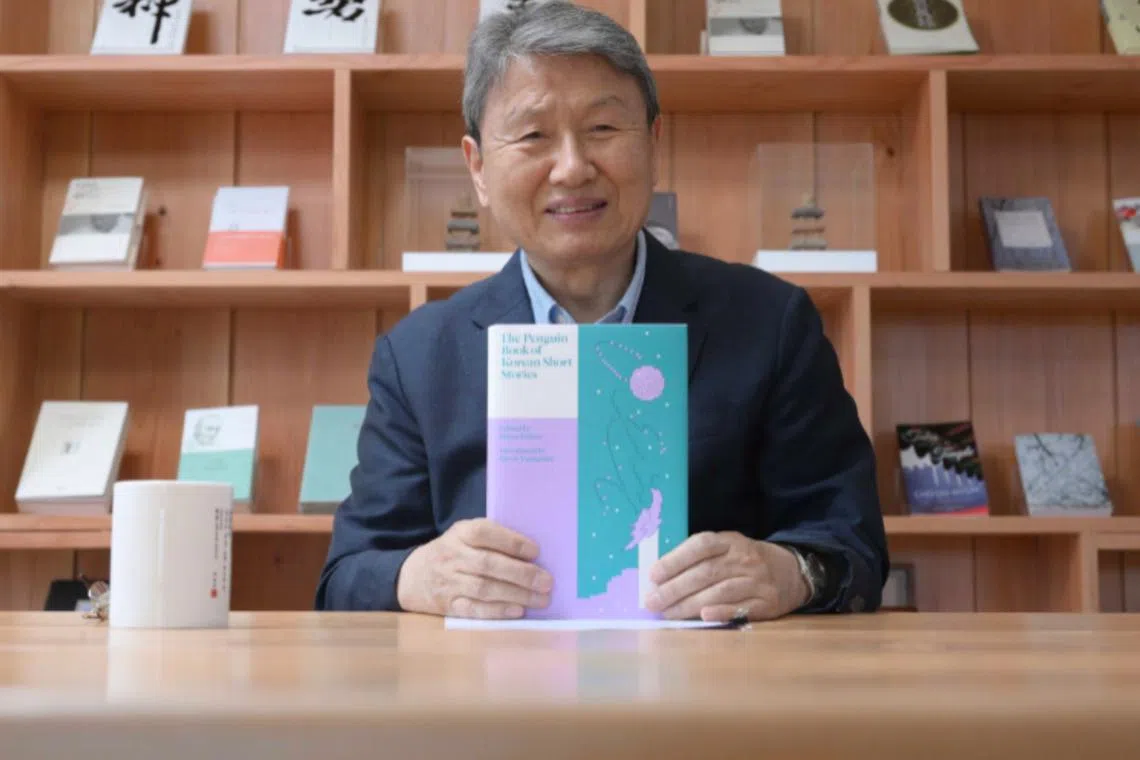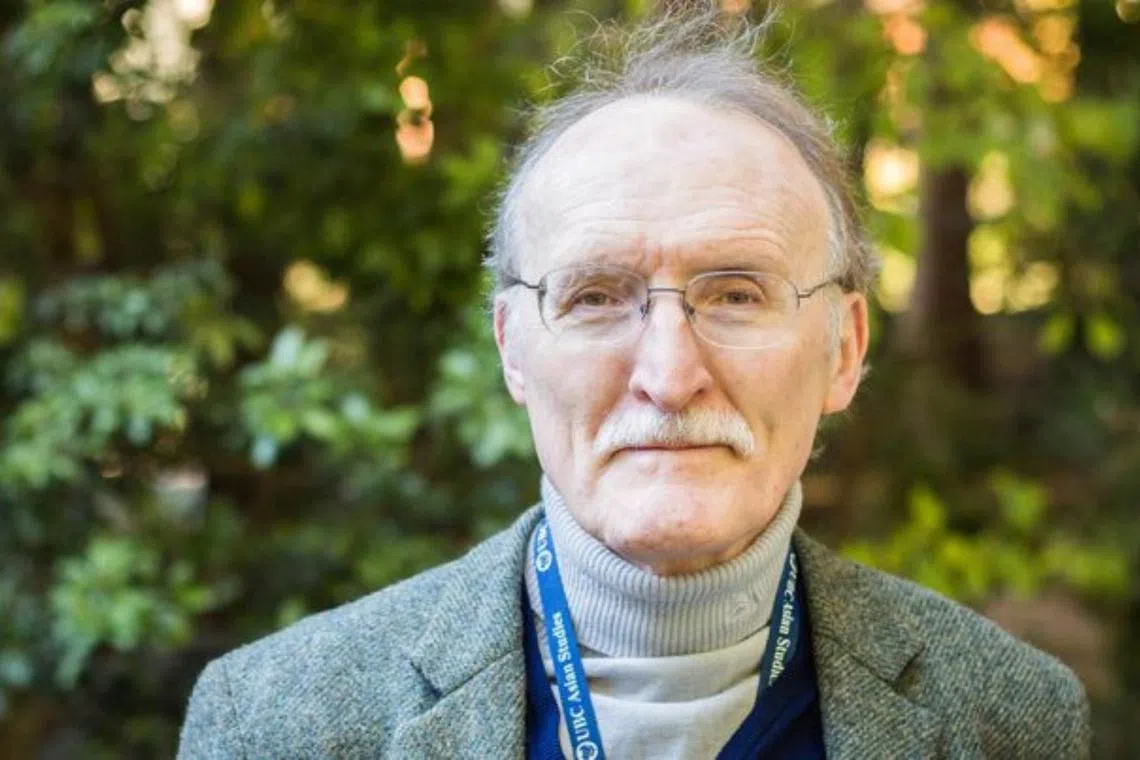Canonical Korean short stories now in English as Penguin Classics
Sign up now: Get ST's newsletters delivered to your inbox

Honorary professor of Korean literature Kwon Young-min expects the anthology to play a significant role in sharing Korean literature.
PHOTO: THE KOREA HERALD/ASIA NEWS NETWORK
Follow topic:
SEOUL - Must-read canonical Korean short stories are now available in English through The Penguin Book Of Korean Short Stories, part of the Penguin Classics collection.
The anthology, co-curated and edited by Associate Professor Bruce Fulton, a translator and professor of Korean Literature and Literary Translation at the University of British Columbia, marks a milestone as the first collection of Korean literature to join the esteemed Penguin Classics series.
The book is described as an “eclectic, moving and richly enjoyable collection” that serves as an essential introduction to Korean literature, according to Penguin Random House. Journeying through Korea’s dramatic recent past, from the Japanese occupation and colonial era to the devastating Korean War and the rapid, disorienting urbanisation of the later decades, the anthology captures a hundred years of vivid storytelling.
The anthology features 26 selected must-read short stories, starting with When The Buckwheat Blooms” by Lee Hyo-seok. It includes works of well-known Korean authors such as Hwang Sun-won, Park Wan-suh, Jo Jung-rae and Shin Kyung-sook, as well as contemporary pieces that offer glimpses into Korean society today, by authors like Pyun Hye-young, Han Yu-joo and Kim Ae-ran.
Also featured are iconic works like Spicebush Blossoms by Kim Yu-jung, Mama And The Boarder by Chu Yo-sup and Wings by Mr Yi Sang.
Dr Kevin Laurence O’Rourke, an Irish Catholic priest and scholar who translated more than 2,000 Korean literary works and died in 2020, co-curated the collection. Prof Fulton added that they selected from an existing pool of translated works.
“We each presented the other with a list of ‘must include’ stories and pared that list down to the 29 stories that we proposed to Penguin UK,” said Prof Fulton. “Of the 25 stories ultimately appearing in the anthology, the bulk come from the mid to late 1930s - an early high point of the Korean short story - and from the new millennium (post-2000).”
“If you read this, you can grasp the overall flow of modern and contemporary Korean history through the novels. From the Japanese colonial era to liberation, the war and the modernisation and industrialisation,” Professor Kwon Young-min, an honorary professor of Korean literature at Seoul National University who wrote the introduction, told The Korea Herald.
The anthologies released as part of the Penguin Classics series are widely adopted as course materials for world literature studies, not only in English-speaking countries.
Prof Fulton and Prof Kwon expect the Korean anthology to play a significant role in sharing the presence and value of Korean literature with readers around the world.
“The inclusion of Korean literature in ‘Penguin Classics’ signals a momentous achievement,” said Prof Kwon. “(It) paves the way for the global recognition of Korean literary masterpieces and opens the doors for readers worldwide to explore the rich culture and artistry of Korean storytelling.”
Prof Fulton said he hopes that readers who find Korean popular culture appealing but have not yet realised the significance of the Korean literary tradition could discover that Korean literature is another important part of Hallyu.
Bringing this anthology to international readers came with its challenges, particularly securing translation rights, according to Prof Fulton.

The anthology was co-curated and edited by Associate Professor Bruce Fulton, a translator and professor of Korean Literature and Literary Translation at the University of British Columbia.
PHOTO: UNIVERSITY OF BRITISH COLUMBIA
“The more difficult challenge was presented by some of the authors and their literary agents. Four stories that we (initially) chose to include in the anthology - by Hwang Sok-yong, Han Kang, Cho Se-hee and Kim Young-ha - were denied permission by the author, the agent, or, in the case of a deceased author, by his son,” said Prof Fulton.
“In the case of one of these denied stories, the author wished to have the story included in the anthology, but his literary agent lied and said the author did not want the story included.”
Prof Fulton and Prof Kwon expressed hope that in the future, more works by Korean authors will be included in similar anthologies.
On a different note, Prof Kwon, who taught Korean literature at the University of California, Berkeley from 2014 to 2022 after retiring from SNU, emphasised the importance of good translations and the role of academia.
“For Korean literature to be known to global readers, it ultimately needs to be translated,” said Prof Kwon. “So good translations are essential to overcome language barriers.”
Moreover, reading foreign literature requires “a special interest,” according to Prof Kwon, and this interest among the general public can be sparked when more academic institutions offer comprehensive courses on Korean literature.
“To cultivate this interest, universities overseas need to teach Korean literature. ...When we have more people teaching Korean literature and more students taking Korean literature courses, the education sparks interests. So it is crucial to have a proper education in Korean culture at universities,” said Prof Kwon. THE KOREA HERALD/ASIA NEWS NETWORK

